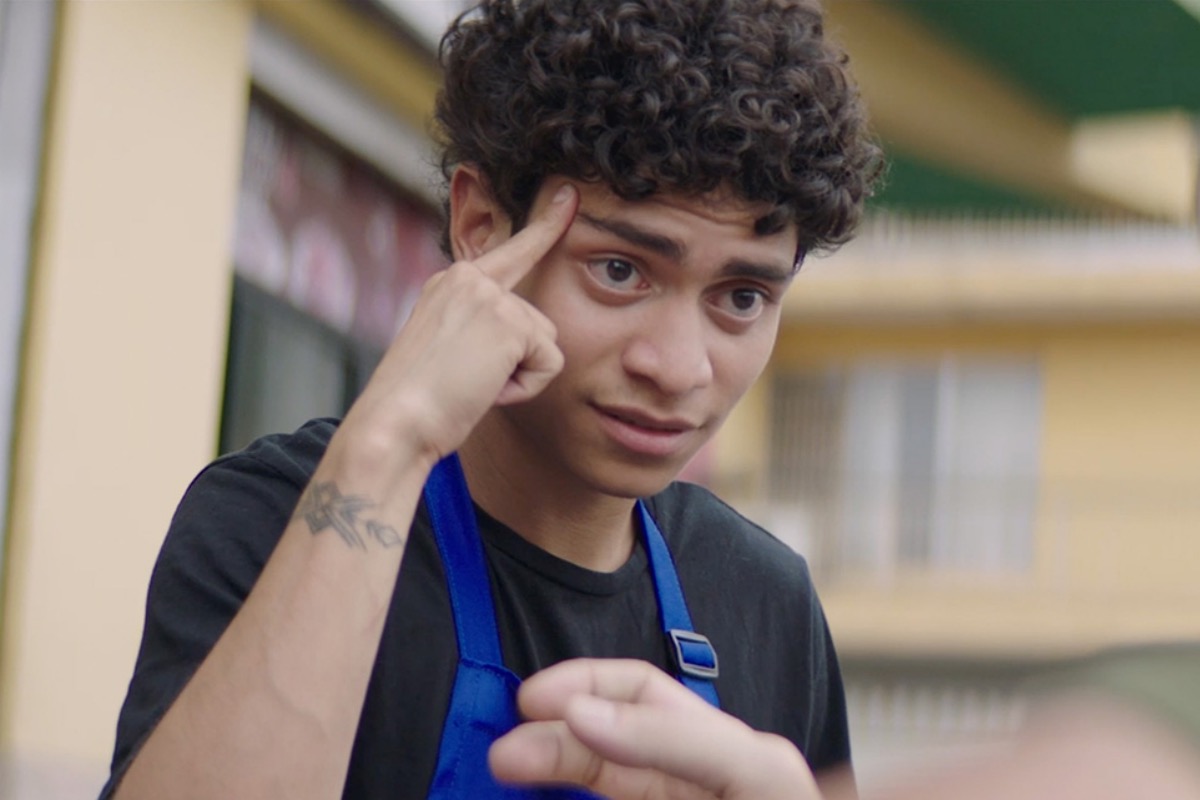

From ‘La Sombra del Sol’ (The Shadow of the Sun) by Venezuelan-American award-winning filmmaker Miguel Ángel Ferrer
La Sombra del Sol translates to “Shadow of the Sun,” and the Venezuelan filmmakers behind this heartfelt film use that metaphor wisely.
The story follows Leo (played by Carlos Manuel González), the traditionally masculine older brother with a voice kissed by God. He used to sing in a rock band but gave it up to take care of his younger brother when their parents died. When the film opens, he’s doing manual labor and having a hard time keeping the most menial of positions.
Opposite him —and it’s debatable who’s the sun and who’s the shadow here— is his younger brother Alex (played by Anyelo López). He’s the dreamer, writing poetry while running their parents’ old bakery. He’s also Deaf and gay, a young man marked by his difference in their small Venezuelan town of Acarigua, but not struck down by it.
Both brothers are plagued by a local gang that extorts the bakery and makes life hard for the locals. To escape their woes, Alex urges Leo to enter a local version of American Idol with sizable prize money, the plan being that Leo will sing and Alex will write the song. Winning may be far-fetched, and the whole endeavor is perhaps silly, but whether it is Alex’s intention or not, pursuing the prize gives Leo new purpose and brings the brothers closer together.
As such, the tension in La Sombra del Sol isn’t in whether they win or not but in how Alex and Leo will grow, together or separately.
The film was screened at the recent Festival del Cine Venezuelano, held in Mérida, Venezuela from July 9 to the 13th, and had its world premiere at the Los Angeles International Latino Film Festival (LALIFF), where Latino Rebels caught up with the writer-director Miguel Ángel Ferrer and lead actor González.
Ferrer remembers attending LALIFF two years ago, saying: “I was so inspired by the ambiance, the whole Latino filmmaking community, that I said to myself, ‘ need to write something. I need to find something that I could do by myself that I didn’t (need to) wait for anybody’s permission to do and bring (it) to this festival.”
He began with a devastating three-way scene between Leo, Alex, and Leo’s girlfriend Yolanda, played in the film by Greisy Mena. González explains his character’s romantic relationship by saying that Leo “has this female partner that he’s been with for years and has never been a real support for him. (She’s) just the complaining part in his head, telling him that he’s not worth it, that he won’t become anything, just a nobody. And he has been living with that and believing in that.”
“I’ve known that kind of relationship in my life,” Ferrer says. “Be careful who you surround yourself with, because there are some people out there that, without being big evil characters or malevolent, they will dull you, they will dull your shine.”
So it follows that La Sombra del Sol is a deeply personal film for Ferrer. He sees himself in both brothers, part of the titular metaphor. He calls Leo “the brother that has all these opportunities and these gifts and that sometimes sees himself as a victim of society, (of his) economic situation, of just the ambiance that surrounds him. But yet he has so much promise.”
In contrast, Alex is “the other brother who is supposed to be the one that has a handicap… He’s the actual hero. He doesn’t let his darkness or anything really in life hold him down.”
Indeed, La Sombra del Sol is a film that shows both its lead characters facing real and difficult challenges. They cannot solve them —because they alone cannot change the economic realities of Venezuela or end homophobia and ableism— but they can find ways to navigate the obstacles in front of them and emerge triumphant.
González calls it “a great feel-good movie about brotherhood, about hope, about following your dreams, about not giving up.”
This optimism in the face of harsh realities tightly reflects Ferrer’s worldview. “For us Latinos, there’s a trend sometimes to portray us, because of our socio-economic situations or political situations, as victims. And that is 100 percent true. There’s a truth to that. But we can be the heroes of our own stories,” he says.
And the two protagonists of the film weren’t the only ones who found joy by navigating seemingly intractable forces.
“One of the gifts of making this project,” says Ferrer, “is being able to work with incredibly talented artists in Venezuela, that are second to none in the filmmaking world. It’s the best crew and the best cast that I’ve ever put together. And they come from a place where sometimes the opportunities are lacking. And it was such a blessing to be able to have their talent in this movie.”
***
Cristina Escobar is the entertainment reporter for Latino Rebels. She is also the co-founder of latinamedia.co, uplifting Latina and gender non-conforming Latinx perspectives in media. She’s a member of the Latino Entertainment Journalists Association and writes at the intersection of race, gender, and pop culture. Twitter: @cescobarandrade


